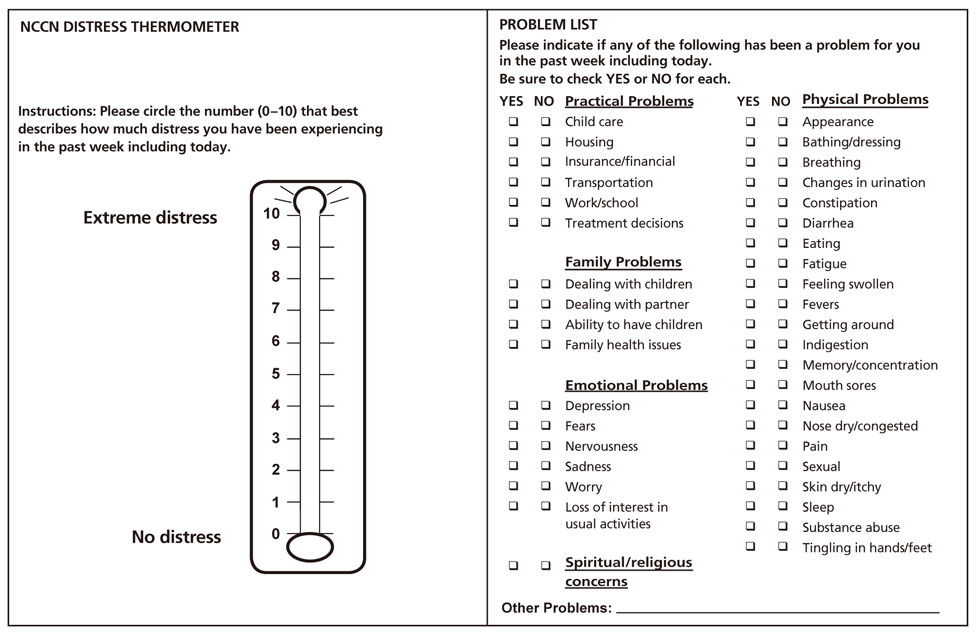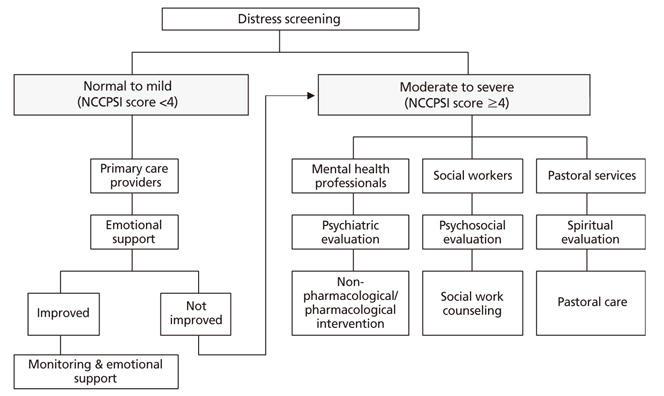J Korean Med Assoc.
2019 Mar;62(3):167-173. 10.5124/jkma.2019.62.3.167.
Update on distress management for cancer patients
- Affiliations
-
- 1Department of Psychiatry, National Cancer Center, Goyang, Korea. psy@ncc.re.kr
- KMID: 2441068
- DOI: http://doi.org/10.5124/jkma.2019.62.3.167
Abstract
- Many cancer patients experience psychological suffering during their journey from diagnosis, through treatment, to survivorship or the end of life. Their psychological distress can become severe enough to interfere with their ability to cope with cancer. Conditions such as anxiety, depression, insomnia, and delirium often occur among cancer patients. Although distress is prevalent in cancer patients, it is often under-recognized and under-treated in the oncology setting. Psychological distress may have a negative effect on patients' quality of life. The prevention, early detection, and proper management of distress are important for improving patients' quality of life during and after cancer treatment. It is therefore necessary to develop a system for assessing and managing distress. The US National Comprehensive Cancer Network developed guidelines for distress management in 1999. Korean recommendations for distress management were released in 2009. The Korean government recently designated integrated supportive care centers for survivors at the National Cancer Center and regional cancer centers. The supportive care service is provided for cancer survivors who have completed first-line anti-cancer treatment. Psycho-oncology is one of the most important components of supportive care in cancer. Distress management yields many benefits for cancer patients, but the reality is that significantly distressed patients are often not properly referred for psychosocial care. All distressed patients should be properly referred for psychosocial care, and the psychosocial care of cancer patients should be integrated into routine cancer care practice.
Keyword
MeSH Terms
Figure
Cited by 1 articles
-
Relationship between Mothers' Diagnosis of Cervical Cancer and Attitudes toward Preventing Cervical Cancer in Their Pubertal Daughters
Da Bit Lee, Hae Won Kim
Korean J Women Health Nurs. 2019;25(4):434-445. doi: 10.4069/kjwhn.2019.25.4.434.
Reference
-
1. Straif K, Baan R, Grosse Y, Secretan B, El Ghissassi F, Bou-vard V, Altieri A, Benbrahim-Tallaa L, Cogliano V. WHO International Agency for Research on Cancer Monograph Working Group. Carcinogenicity of shift-work, painting, and fire-fighting. Lancet Oncol. 2007; 8:1065–1066.
Article2. Michael YL, Carlson NE, Chlebowski RT, Aickin M, Weihs KL, Ockene JK, Bowen DJ, Ritenbaugh C. Influence of stres-sors on breast cancer incidence in the Women's Health Initi-ative. Health Psychol. 2009; 28:137–146.
Article3. Dalton SO, Mellemkjaer L, Olsen JH, Mortensen PB, Johansen C. Depression and cancer risk: a register-based study of patients hospitalized with affective disorders, Denmark, 1969–1993. Am J Epidemiol. 2002; 155:1088–1095.
Article4. Nakaya N, Bidstrup PE, Saito-Nakaya K, Frederiksen K, Koskenvuo M, Pukkala E, Kaprio J, Floderus B, Uchitomi Y, Johansen C. Personality traits and cancer risk and survival based on Finnish and Swedish registry data. Am J Epidemiol. 2010; 172:377–385.
Article5. Johansen C. Psychosocial factors. In : Holland JC, Breitbart WS, Butow PN, Jacobsen PB, Loscalzo MJ, McCorkle R, editors. Psycho-oncology. New York: Oxford University Press;2015. p. 35–39.6. Derogatis LR, Morrow GR, Fetting J, Penman D, Piasetsky S, Schmale AM, Henrichs M, Carnicke CL Jr. The prevalence of psychiatric disorders among cancer patients. JAMA. 1983; 249:751–757.
Article7. Schag CA, Heinrich RL. Anxiety in medical situations: adult cancer patients. J Clin Psychol. 1989; 45:20–27.
Article8. Doolittle MN, DuHamel KN. Posttraumatic stress disorder associated with cancer diagnosis and treatment. In : Holland JC, Breitbart WS, Butow PN, Jacobsen PB, Loscalzo MJ, McCorkle R, editors. Psycho-oncology. New York: Oxford University Press;2015. p. 323–338.9. Kelly CM, Juurlink DN, Gomes T, Duong-Hua M, Pritchard KI, Austin PC, Paszat LF. Selective serotonin reuptake inhi-bitors and breast cancer mortality in women receiving tamoxi-fen: a population based cohort study. BMJ. 2010; 340:c693.
Article10. Berger AM. Update on the state of the science: sleep-wake dis-turbances in adult patients with cancer. Oncol Nurs Forum. 2009; 36:E165–E177.
Article11. Espie CA, Fleming L, Cassidy J, Samuel L, Taylor LM, White CA, Douglas NJ, Engleman HM, Kelly HL, Paul J. Randomized controlled clinical effectiveness trial of cognitive behavior therapy compared with treatment as usual for persi-stent insomnia in patients with cancer. J Clin Oncol. 2008; 26:4651–4658.
Article12. Lawlor PG, Gagnon B, Mancini IL, Pereira JL, Hanson J, Suarez-Almazor ME, Bruera ED. Occurrence, causes, and outcome of delirium in patients with advanced cancer: a pro-spective study. Arch Intern Med. 2000; 160:786–794.
Article13. Holland J, Lewis S. JH Kim . Human side of cancer. Seoul: Yeoreumsa;2014.14. Kim JH. Introduction to psycho-oncology. Goyang: National Cancer Center;2019.15. Holland JC, Andersen B, Breitbart WS, Buchmann LO, Com-pas B, Deshields TL, Dudley MM, Fleishman S, Fulcher CD, Greenberg DB, Greiner CB, Handzo GF, Hoofring L, Hoover C, Jacobsen PB, Kvale E, Levy MH, Loscalzo MJ, McAllister-Black R, Mechanic KY, Palesh O, Pazar JP, Riba MB, Roper K, Valentine AD, Wagner LI, Zevon MA, McMillian NR, Freedman-Cass DA. Distress management. J Natl Compr Canc Netw. 2013; 11:190–209.
Article16. Ministry of Health and Welfare. Recommendations for dis-tress management toward improvement of quality of life in cancer patients. Seoul: Ministry of Health and Welfare;2009.17. Ministry of Health and Welfare. Development of delivery sys-tem for integrated supportive cancer survivor care. Sejong: Ministry of Health and Welfare;2013.18. Ministry of Health and Welfare. Operation plan of the nation cancer survivor support center. Sejong: Ministry of Health and Welfare;2017.
- Full Text Links
- Actions
-
Cited
- CITED
-
- Close
- Share
- Similar articles
-
- Cancer Patient’s Distress: Mainly about Depression and Anxiety
- Distress Management in Patients with Digestive Cancer
- Overview of Psychopharmacotherapy for Cancer Patients
- Psychological Aspects of Care in Cancer Patients in the Last Weeks/Days of Life
- Feasibility of Psychosocial Distress Screening and Management Program for Hospitalized Cancer Patients



